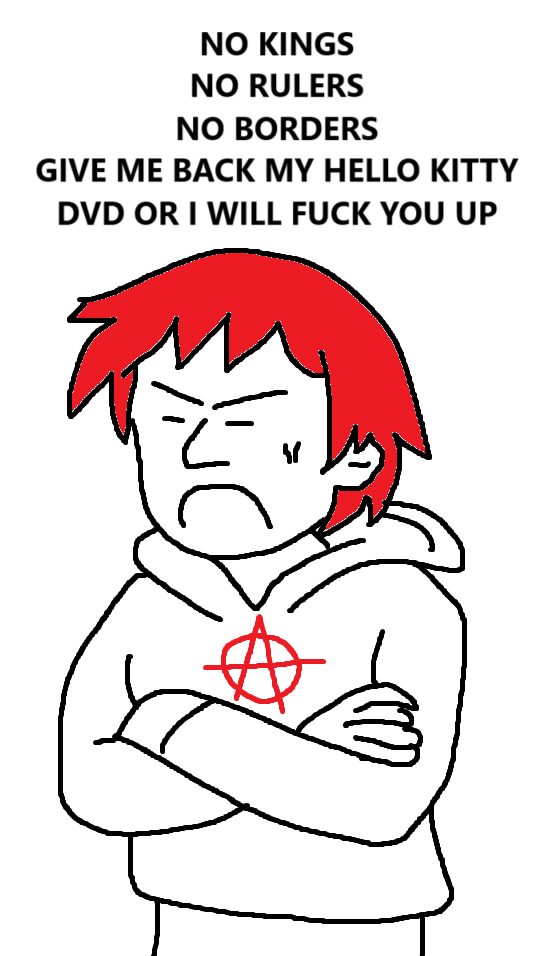[dude with glasses in a communist t-shirt, arguing] I’m the only leftist here, your opinions are TRASH
[dude holding a theory book on smug, arguing] Read theory you losers, you’re all WRONG
[dude in an anarchist hoodie, arguing] Nuh-uh, I’m the only leftist here, you’re SHITLIBS
[the three dudes are now caught in a cartoon fight, glasses gone flying, punches everywhere, while a firing squad of nazis are targeting them with rifles]
[a confused nazi asks] Why… why are they still arguing?



This isn’t infighting between liberals and leftists, this is infighting between different flavours of leftism, like anarchism and marxist-leninism.
Or Marxism and Marxist-leninist.
Say what you will about Democrats. Outside of the elected ones. Most of them don’t have a strong ideology. Just actually wanting things to improve. But I’m sure of how to go about it. And when you approach them like that. Are plenty likely to be sympathetic and allies.
Not really sure what you’re trying to say here as “Marxism and Marxism-Leninism.” Are you saying these are antagonistic ideologies? Marxism is an umbrella, not a tendency within itself. History has progressed since Marx, and Marxist theorists since Marx have developed theory and practice accordingly. By far the largest tendency in Marxism is Marxism-Leninism, the closest to a “pure” Marxism you can get is Orthodox Marxism, which itself is ironically anti-Marxist and is overall an extreme fringe belief among Marxists.
ah yes, because marxist-leninism has no history of its adherents glorifying imperialism or state-capitalism.
Correct. Neither imperialism is glorified, nor is state-capitalism like the US Empire, Republic of Korea, Singapore, or Bismarck’s Germany if you want an earlier example, are glorified by Marxism of any kind.
i didnt claim that.
nevertheless, china was oddly missing in ur list of state-capitalist nations that werent glorified…
Your claim, sarcasm aside, was that Marxist-Leninists have a history of glorifying imperialism and state-capitalism, which I rejected, and said not just Marxism-Leninism but all Marxism rejects both. Either you’re trying to say Marxism-Leninism isn’t Marxist, in which case some heavy justification is required, or I misunderstood your point, in which case I’d appreciate elaboration.
As for the PRC, I didn’t list it as state-capitalist for the same reason I wouldn’t list the US as socialist. The PRC has a socialist market economy. The large firms and key industries of the PRC are publicly owned, and the medium firms are heavily controlled by the state and rely on the publicly owned key industries to function. Private property and the bourgeoisie don’t have political power because they don’t control the large firms or key industries.
What distinguishes state capitalism from socialism is private ownership of the large firms and key industries, or public ownership. The US, Singapore, ROK, etc all have large megacorps with firm control of the state, which uses its power to relatively guide and plan the economy for private interest. In the PRC, the opposite is the case, since the large firms and key industries are publicly owned and planned, the bourgeoisie doesn’t have political control, the proletariat does. This is reflected in over 90% approval rates for the government in the PRC.
The reason the PRC has a bourgeoisie and private property to begin with is because they haven’t yet developed out of it. They are still in a relatively early stage of socialism, market forces are quite useful for small and medium firms to grow into centralized firms that can be gradually sublimated and folded into public ownership. This is a Marxist understanding of economics, and while it isn’t what an anarchist would want, I don’t personally define socialism in a manner that excludes Marxism.
Does that make sense?
my claim was not about marxism or marxist-leninism, but specifically its adherents. i dont think that marxism inherently glorifies state-capitalism or imperialism, but i recognize that an uncomfortably large portion of its adherents do.
as to ur explanation of chinas economic system…
it seems that u define socialism as public ownership of industry/means of production, and capitalism as private ownership of these.
i would argue that public ownership should refer to the public i.e. the populace of the area, not the state that claims to represent them, yet according to u is disapproved of by 10% of its people.
and when the state owns all/most of the firms, and the workers/proletariat does not own them, this is another form of capitalism: one where the state owns the means of production. therefore, state capitalism.
id recommend this video series that tries to explain the state and its function in different historical contexts:
part 1: https://www.youtube.com/watch?v=uTwxpTyGUOI
its also available in text format if u prefer reading: https://theanarchistlibrary.org/library/anark-the-state-is-counter-revolutionary
Regarding Marxists and imperialism/state capitalism, I suppose I just disagree with you there, either we are using different definitions of imperialism just like we are using different definitions of socialism and state capitalism, or you’re seeing something I don’t.
As for me, and socialism vs capitalism, socialism is essentially a mode of production by which collectivized ownership forms the principle aspect of society, ie the base. In practical terms, that means the large firms and key industries, which have control over the rest of the economy (controlling the rubber factory means you have power over the rubber ball factory, as an example). Capitalism is the reverse, privatized ownership of the large firms and key industries, and thus bourgeois control.
Returning to the state, the state is an extension of the ruling class, not a class in and of itself. This is principly the Marxist stance, here. The reason state ownership in a principly publicly owned economy is socialist, is because that necessitates proletarian control. If the bourgeoisie only control the medium firms, and only to the extent that they cannot work against the common, collective plan, then they have no political power, the proletariat does. The small firms are largely cooperative or petite bourgeois property in the PRC, meaning the bourgeoisie proper really only has the non-essential, smaller-scale industry. As a side note, 10% is actually higher than the disapproval rate. Disapproval is highest at the township level, but gets higher the more central you get, with only 4.3% disapproving at the top level:
State ownership is not juxtaposed with proletarian ownership, if the proletariat actually directly owned and controlled the tools they used, they would not be proletarian, but petty bourgeois. Cooperative ownership, in small-scale firms, is petty bourgeois ownership. This isn’t intrinsically an issue in a broader socialist economy, but without collectivized ownership you cement class divisions, ie each cooperative is its own competing cell, rather than existing in the context of a collectivized economy run by all in the interests of all.
Capitalism, on the other hand, relies on the M-C…P…C’-M’ circuit of reproduction. State-run industries don’t have to adhere to this, they don’t need to run a profit and they don’t need to compete in a market, but in capitalism, this is the dominant mode of production over the largest and key firms and industries. The difference between how the US, for example, and PRC functions is dramatic, and its why the PRC has such large approval rates.
As for the state, Marxists and anarchists have different views. Marxists see the state as an instrument of class oppression that exists as long as class does, and so in order to get rid of it, all property needs to be gradually sublimated into collectivized property, across all of society. The principle difference is between centralization and collectivization vs decentralization and horizontalism.
I appreciate the link, but as a former anarchist myself I’m already familiar with the anarchist perspective. I’m not trying to debate anarchism, or try to explain why I agree more with Marxism and Marxism-Leninism, just defend Marxism from what I recognize as misrepresentations of it. Anark’s central premise seems to be that the state creates classes, which fundamentally relies on either a different definition of class at best or a misunderstanding of the state and class at worst.
it does seem that we have very different understandings of the state.
in my mind, a disapproval rating larger than 0% already shows that the state =/= its people and the people do not truly control the state.
also, by the people owning industry, i meant all of them, not some subset. this means it doesnt create class distinctions, in fact, even if it was previously owned and controlled by the state (a subset of the people), this would be a reduction of class distinctions in my mind.
i think the crux of our disagreement is that u seem to consider the state as equivalent/“an extension” to the people, while i want to clarify that one may claim to be controlled entirely by the people, but this does not make it so.
Regarding approval rates, all classes were interviewed, including the bourgeoisie. Further, you will not find 100% of people agreeing that the Earth is round, flat-Earthers exist. What should be recognized is that the PRC has some of the highest approval rates in the world, and that that number appears to be increasing over the course of the study. I don’t think your argument that there being a non-zero number of Chinese citizens that disapprove of the government doesn’t mean the people aren’t in charge of it, Chinese citizens aren’t a hive-mind nor is the PRC a classless society. Class struggle is very much alive in China.
As for state-ownership, that doesn’t mean those in government are the actual owners. That’s not how public ownership works, again, the state isn’t a class, but an extension, in the PRC’s case of the proletariat. Public ownership rests on ownership among all citizens, just because said citizens elect managers and administrators doesn’t mean these managers and administrators are the owners. If I am a local manager of a McDonalds store, I’m not the owner, I’m still a proletarian.
I don’t consider the state to be equivalent to the people. I do consider the state to be an extension of the ruling class. Further, I see the state the same way Marx did, as purely the repressive elements of government that uphold the ruling class and oppress the other classes, and that once production is all centralized and democratized globally, fully collectivized, there won’t be any class and thus no state, but there will be administrators, managers, accountants, etc as there must be in the kind of large-scale and interconnected production that the Marxist conception of communism holds as its basis.
The principle distinction between anarchism and Marxism is in decentralization and horizontalism vs centralization and collectivization. I hold both as socialist, and much prefer the Marxist framework of analysis, but don’t really waste much time trying to discredit anarchism or anarchists.
You’re reading a different set of comments to me then, the ones I’m seeing are full of bluemaga liberals like Optional or Eldritch insisting that “left unity” means getting behind the Democrats and left punching communists.